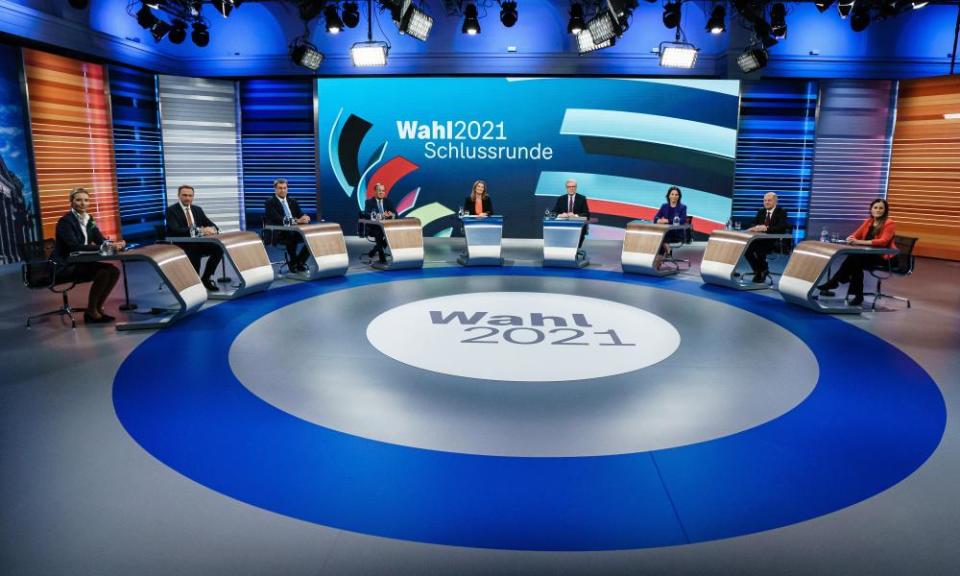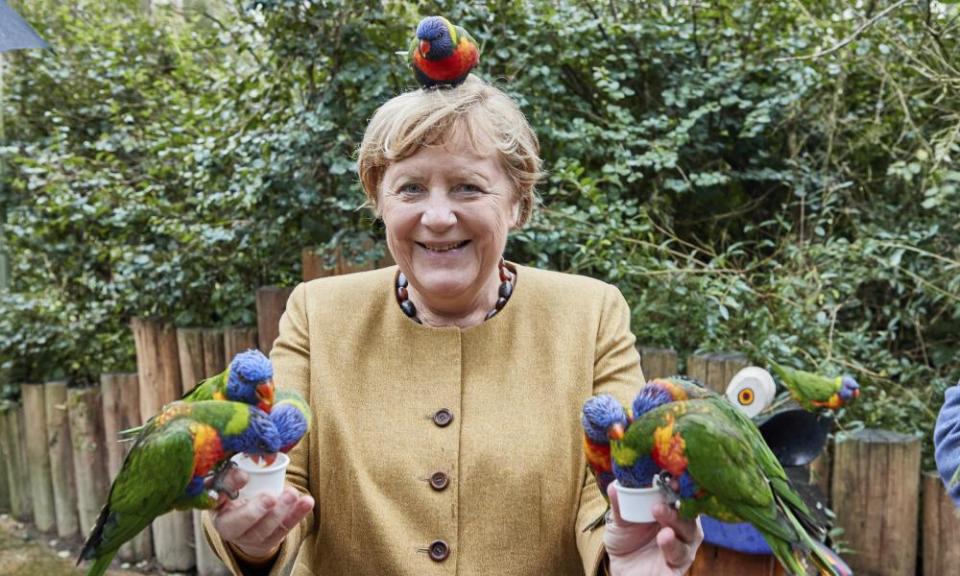German election too close to call as polls find SPD has lost its lead

The race to succeed Angela Merkel as German chancellor remains completely open two days before western Europe’s most populous country goes to the polls, with the latest predictions showing the leading parties almost neck and neck.
Two leading polls published on Friday ahead of Sunday’s election indicate the Social Democrats (SPD) have lost their lead over the Christian Democrats (CDU). One, carried out by Civey for the broadcaster ZDF, showed the SPD to be stable on 25%, but the CDU to have risen to 23%. A poll released later in the day for the polling institute Allensbach for the Frankfurter Allgemeine Zeitung showed the race to be even tighter, with the SPD on 26%, the CDU on 25%.
The SPD had been on a roll for weeks but has seen its lead whittled down to such a wafer-thin majority that its advantage is in effect non-existent, especially when a statistical margin of error of about 2.5% is also taken into account.
Related: German election poll tracker: who will be the next chancellor?
The battle for the runner-up is almost as open, and is being followed just as closely by punters, as it could be as, if not more decisive, in determining the make-up of the new government. The Green party is shown in the final polls to be on 16% and the FDP on 10.5% to 12%. The far-right AfD is on 10% followed by the far-left Die Linke on 5% to 6%, which means it is on the verge of not being reelected into parliament.
However, by a considerable margin, the most popular candidate for chancellor remains Olaf Scholz of the SPD, with 47% of those polled saying they would choose him if there was a direct vote for chancellor, while 20% said they were in favour of Armin Laschet of the CDU. Just 16% said they wanted Annalena Baerbock of the Greens.

A coalition government seems an inevitability and a three-way alliance is highly likely, the first time this will have happened on a national level, in a reflection of the increasing fragmentation of German politics that is also occurring elsewhere in Europe and beyond.
The resulting scenario will have wide-reaching consequences for how a new government operates as well as affecting Germany’s future role as a leading voice in Europe. Weeks, if not months, of heated negotiations over forming a new government are expected.
On Thursday night, the lead candidates of all seven parties expected to enter the Bundestag met for a final television debate, in which they sparred over the issues that have shaped the campaign, from economic recovery to climate change, pandemic management to energy security. But the gathering was too large, the time each candidate had too brief, to allow any one of them to make a significant impact.
Related: The crisis manager: Angela Merkel’s double-edged European legacy
The debate followed three previous encounters over the past month with the leaders of the CDU, SPD and Greens, after which audience polls had declared Scholz, the SPD leader, to be the winner on each occasion.
Thursday night’s debate opened with focus on the fatal shooting earlier this week of a petrol station attendant in Rheinland-Palatinate after he had asked a customer to wear the mandatory medical face mask, an incident that has shocked Germany.
It triggered discussion on a wide range of security issues including the tightening of gun laws, online hate speech and arguments over the necessity of the coronavirus restrictions still in place across Germany.
The collapse in support for the CDU and its sister party, the Christian Social Union (CSU), has been the main talking point throughout this campaign, with much blame especially within the conservative alliance itself having been put at the door of its candidate, Laschet, who is also the leader of Germany’s most populous state of North Rhein-Westphalia (NRW).
His campaign has been gaffe-prone – its lowest point came shortly after the floods that wreaked havoc in NRW and neighbouring Rheinland-Palatinate, when Laschet was caught on camera laughing during a moment of remembrance for the more than 180 people who died. His own party is perceived as being drained, empty of innovation or inspiration after 16 years in power under Merkel.
Even if the CDU catches up on the SPD, it is still on course for one of the worst results in its almost eight-decade history.
Relative to the CDU, the SPD has appeared to flourish, though even within the party itself its advantage is put down to some extent to a mix of luck and circumstance that could evaporate at any moment. Scholz, as incumbent finance minister who has helped steer the German economy through the pandemic, has presented himself as something of a continuity candidate to Merkel – even briefly adopting her famous rhomboid hand gesture, which, while meant as a joke, has gone down well with the electorate – at the same time as promising a change of course and widespread reform.
However, when it comes to the votes it has garnered over the past two decades, the SPD, like the CDU, remains a shadow of its former self as it has haemorrhaged supporters to other parties.
The party also remains haunted by the rise and fall of Martin Schulz, the former president of the European parliament who had stood as the party’s chancellor candidate in 2017 and had initially been on a roll before the SPD fell to a postwar low in the election.
The Greens have not escaped a bumpy ride throughout the campaign, having dropped from 28% in April after Baerbock was appointed its lead candidate, to 16%. Despite environmental issues being its raison d’être, the party has failed to benefit from recent environmental disasters, including Germany’s historic floods. In fact, it has actively resisted appearing to want to do so – even its own supporters accuse it of having shied away from seizing the reins over outlining the scale and challenge of the climate emergency.
Nevertheless, the Greens are very likely to play a significant role in any new government, in shaping future environmental policy as Germany struggles to meet the goals set out in the Paris agreement to reduce its carbon emissions.
On Friday, thousands of campaigners for Fridays for Future gathered in Berlin joined by the Swedish activist Greta Thunberg, accusing the traditional parties of failing to take the climate emergency seriously and demanding the new government do so.
One of their key requests is for what it calls “generational justice” – young people make up the smallest group of voters and parties are perceived to have shaped their manifestos to appeal to the older generation who are statistically less interested in environmental concerns.
Nearby, in a camp outside the Bundestag, a group of climate emergency campaigners calling themselves The Last Generation, entered the 25th day of a hunger strike. They are demanding a public audience with the three main candidates for chancellor ahead of polling day and calling for the establishment of a citizens’ assembly for climate policy.

 Yahoo Finance
Yahoo Finance 